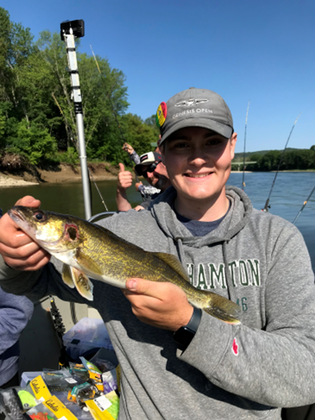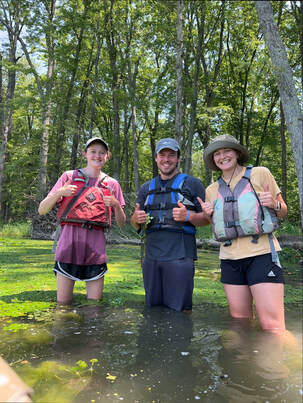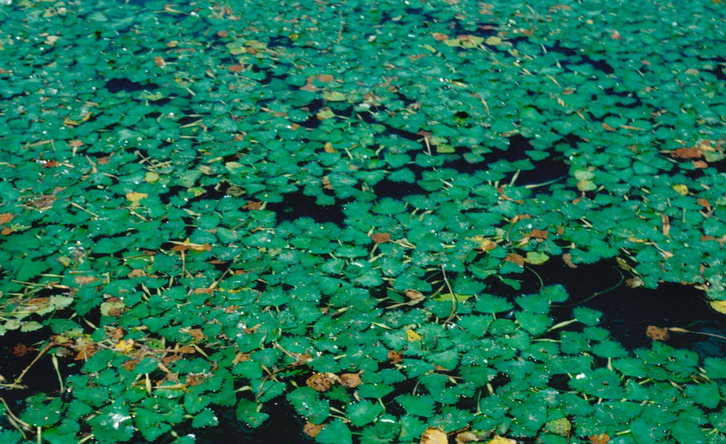MEET OUR 2023 WATER CHESTNUT CREW
Water Chestnut Hand Harvesting Project
Jenna Canipe, Co-Crew Leader
July 14, 2023
The water chestnut hand harvesting project at OCSWCD is vital and important to maintaining and preserving the livelihood of the not only the residents of Cross Lake and Seneca River, but also the wildlife. Water chestnuts are a fast-spreading invasive species that originated from Europe, Asia, and Africa, they first made their appearance in the United States in the 1870s. Water chestnuts thrive in slow moving freshwater at depths up to 16 feet. One single plant can produce 15-20 seeds and each seed can produce up to 15 steams. This means one plant has the potential to produce up to 300 plants in the following year. The seeds of these plants make them even more of a nuisance. They are extremely sharp and can stay viable in the mucky substrate for up to 12 years. This requires a site with water chestnuts to be monitored for at least 12 years to be sure the plant is eradicated from the area.
In the U.S. water chestnuts do not have any natural predators to control the spread. This allows them to form dense mats that are hazardous to boaters, kayakers, swimmers, and other water related activities. These mats also have major impacts on wildlife. Native aquatic plants that create habitats for fish, waterfowl, insects, and others are outcompeted by this invasive and are often unable to grow. The water chestnuts shade out and do not allow sunlight to penetrate the water to reach native plants. The air-water interface of oxygen exchange into the water is also greatly reduced. In the fall these massive mats begin to die off. This causes an increase in the depth of organic material at the bottom of the water body. It also creates a reduction in dissolved oxygen levels in the water which can cause a fish to die off.
Our job this summer is to hand-pull as many water chestnuts out of Cross Lake and the Seneca River system as possible. We use a 14-foot john boat and a kayak to pick the water chestnuts out of the water and place them in bins that weigh 35lbs each when full. As of July 14th of this year, we have harvested 20,220 wet pounds of water chestnuts. These pulled plants are then dumped at local participating farm fields to provide nutrients and organic matter to the soil. It is very important the community also does their part to help reduce the spread. This can be done by hand pulling water chestnuts in the area, cleaning watercraft, including tailer, and detecting new infestations early.
Jenna Canipe, Co-Crew Leader
July 14, 2023
The water chestnut hand harvesting project at OCSWCD is vital and important to maintaining and preserving the livelihood of the not only the residents of Cross Lake and Seneca River, but also the wildlife. Water chestnuts are a fast-spreading invasive species that originated from Europe, Asia, and Africa, they first made their appearance in the United States in the 1870s. Water chestnuts thrive in slow moving freshwater at depths up to 16 feet. One single plant can produce 15-20 seeds and each seed can produce up to 15 steams. This means one plant has the potential to produce up to 300 plants in the following year. The seeds of these plants make them even more of a nuisance. They are extremely sharp and can stay viable in the mucky substrate for up to 12 years. This requires a site with water chestnuts to be monitored for at least 12 years to be sure the plant is eradicated from the area.
In the U.S. water chestnuts do not have any natural predators to control the spread. This allows them to form dense mats that are hazardous to boaters, kayakers, swimmers, and other water related activities. These mats also have major impacts on wildlife. Native aquatic plants that create habitats for fish, waterfowl, insects, and others are outcompeted by this invasive and are often unable to grow. The water chestnuts shade out and do not allow sunlight to penetrate the water to reach native plants. The air-water interface of oxygen exchange into the water is also greatly reduced. In the fall these massive mats begin to die off. This causes an increase in the depth of organic material at the bottom of the water body. It also creates a reduction in dissolved oxygen levels in the water which can cause a fish to die off.
Our job this summer is to hand-pull as many water chestnuts out of Cross Lake and the Seneca River system as possible. We use a 14-foot john boat and a kayak to pick the water chestnuts out of the water and place them in bins that weigh 35lbs each when full. As of July 14th of this year, we have harvested 20,220 wet pounds of water chestnuts. These pulled plants are then dumped at local participating farm fields to provide nutrients and organic matter to the soil. It is very important the community also does their part to help reduce the spread. This can be done by hand pulling water chestnuts in the area, cleaning watercraft, including tailer, and detecting new infestations early.
SEE BELOW CONTRACTORS PROVIDING WATER CHESTNUT CULLING SERVICES;
Curb Appeal of CNY, LLC Kara Croyle
Joe Marotti-Owner EnviroAquatics
4734 Lythim Circle 2797 State Route 12B
Manlius, NY 13104 Hamilton, NY 13346
Tel. 315-692-2464 315-706-2565
[email protected] [email protected]
Feliciano Landscape, LLC Jim McNamee
36 Nelson Street Aquatic Weed Harvesting
Auburn, NY 13021 PO Box 39
Tel. 315-263-9598 Craryville, NY 12521
[email protected] 518-441-7742
[email protected]
Madcal Enterprises
315-317 Burnet Ave.
Syracuse, NY 13203
Tel. 315-751-3953
[email protected]
Gasparini Landscaping Co., Inc. Mike Shea
Gary Gasparini Blue Wave Water Works
5072 Smoral Road 4568 Becker Rd.
Camillus, NY 13031 Brewerton, NY 13029
Tel. 315-488-4261 x9 315-484-6453
[email protected] [email protected]
Dr. Janitor Cleaning ‘n Landscapes Daniel Andrews
Leannue McMullen Cross Lake Aquatic Services
319 Allen Street 6778 Reeves Rd.
Syracuse, NY 13210 Jordan, NY 13080
Tel. 315-450-8514 315-729-8863
[email protected]
Gary Leroux
CNY Aquatic Harvesting
3774 State Rt. 3
Fulton, NY 13069
315-529-1124
[email protected]
___________________________________________
CHEMICAL TREATMENT ORGANIZATIONS
A-Tip Control, Inc.
5681 Zerfass Rd.
Dansville, NY 14437
585-335-9299
Chase Enterprises
24 County Route 1A
Oswego, NY 13126
833-216-6337
Solitude Lake Management
20 Main Street
Worcester, NY 12197
844-412-1236
CNY Drone Services Auburn Ag Products, LLC
6883 Dawes Ave. 6140 Broadway Rd.
Clinton, NY 13323 Auburn, NY 13021
315-723-4664 [email protected]
315-246-7642
Riveredge Associates, LLC
58 Old River Rd.
Massena, NY 13662
315-323-2525
Curb Appeal of CNY, LLC Kara Croyle
Joe Marotti-Owner EnviroAquatics
4734 Lythim Circle 2797 State Route 12B
Manlius, NY 13104 Hamilton, NY 13346
Tel. 315-692-2464 315-706-2565
[email protected] [email protected]
Feliciano Landscape, LLC Jim McNamee
36 Nelson Street Aquatic Weed Harvesting
Auburn, NY 13021 PO Box 39
Tel. 315-263-9598 Craryville, NY 12521
[email protected] 518-441-7742
[email protected]
Madcal Enterprises
315-317 Burnet Ave.
Syracuse, NY 13203
Tel. 315-751-3953
[email protected]
Gasparini Landscaping Co., Inc. Mike Shea
Gary Gasparini Blue Wave Water Works
5072 Smoral Road 4568 Becker Rd.
Camillus, NY 13031 Brewerton, NY 13029
Tel. 315-488-4261 x9 315-484-6453
[email protected] [email protected]
Dr. Janitor Cleaning ‘n Landscapes Daniel Andrews
Leannue McMullen Cross Lake Aquatic Services
319 Allen Street 6778 Reeves Rd.
Syracuse, NY 13210 Jordan, NY 13080
Tel. 315-450-8514 315-729-8863
[email protected]
Gary Leroux
CNY Aquatic Harvesting
3774 State Rt. 3
Fulton, NY 13069
315-529-1124
[email protected]
___________________________________________
CHEMICAL TREATMENT ORGANIZATIONS
A-Tip Control, Inc.
5681 Zerfass Rd.
Dansville, NY 14437
585-335-9299
Chase Enterprises
24 County Route 1A
Oswego, NY 13126
833-216-6337
Solitude Lake Management
20 Main Street
Worcester, NY 12197
844-412-1236
CNY Drone Services Auburn Ag Products, LLC
6883 Dawes Ave. 6140 Broadway Rd.
Clinton, NY 13323 Auburn, NY 13021
315-723-4664 [email protected]
315-246-7642
Riveredge Associates, LLC
58 Old River Rd.
Massena, NY 13662
315-323-2525


